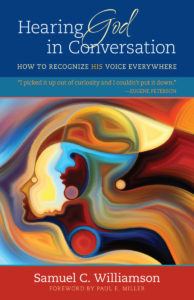Of all the ways God speaks, the one I like least (and fear most) is his silence. The absence of his voice seems to come at the moments I most desperately long for a word. In those moments, his silence feels like God at his cruelest.
[Click here to listen to this article in your podcast app, with added commentary]

We cry out to God, we promise to do exactly as he says, and we get silence. It hardly seems fair.
Paradoxically, God often speaks the loudest in his silence. But his words do not always come as a voice. They come as action. Later in life, when we remember the silent voice of God, it is those “words” we come to treasure most. His Spirit breathes life into our lives, and his silent words somehow take shape in our hearts.
Learning to hear God is not a gimmick. We can’t force God’s hand to do all we think is needed, and we certainly can’t force his lips to speak when we think best. He doesn’t respond to our incantations like a dog to his master’s command.
He is God, and he speaks in the moments that he determines best and with the methods he knows we need most. And some lessons need the laboratory, not the lecture hall.
God is always speaking—always! But some words need to be shown, not told.
Consider the Life of Esther
Esther lived when Persia ruled most of the known world. Tens of thousands of Jews live scattered in exile throughout the Persian empire. The grand vizier Haman hates these alien Jews, and he convinces King Xerxes (mostly through bribery) to exterminate every last one.
This is THE time for God to speak or send a prophet. Instead God acts. Just look at the story:
- King Xerxes gets drunk and commands Queen Vashti to parade herself before his drunken friends.
- Queen Vashti refuses.
- The king holds the world’s first international beauty pageant. Esther is crowned Queen.
- Esther’s uncle Mordecai overhears and then foils a plot to assassinate the king.
- But the king forgets to reward Mordecai.
- Evil Haman convinces King Xerxes to kill all the Jews and steal their wealth, and Haman secretly builds gallows on which to hang Mordecai.
- That night the king can’t sleep, so he orders past court records to be read (which would put anyone to sleep). Mordecai’s story of loyalty is retold and the king realizes he had forgotten to reward Mordecai.
- At that very moment, Haman enters the court to tell of his plans to hang Mordecai. The king asks Haman what should be done for the man that pleases the king. Haman (sure that man must be himself) suggests an elaborate, city-wide honoring ceremony.
- The king tells evil Haman to lead the procession that will honor Mordecai.
- Queen Esther invites the king and Haman to a couple dinner parties. She tells the king (in Haman’s presence) that Haman’s plot to exterminate the Jews will include her.
- Haman is killed on the gallows he built for Mordecai, and all of God’s people are saved.
If any single event hadn’t occurred, the Jews would have been wiped out: if the king hadn’t gotten drunk, or if Vashti hadn’t refused, or if the king had rewarded Mordecai immediately (instead of forgetting), or if the records hadn’t been read that very night … destruction.
The Strangest Twist in Scripture
And yet … Esther is the only book in the Bible in which God is not mentioned.
No prophecies, no prayers, and not one use of the word “God.” It’s like the proofreader, at the very last moment, says, “Wait, we forgot to mention God!” and the production manager says, “Oops, too late, the book has already gone to print.”
Throughout the book of Esther, God is silent. Not One Word. Can that possibly be just an editorial mistake?
Or does Esther’s story show God speaking on every page, revealing his unbelievable ability to turn all things (even evil plots against his people) into good; so that later, when we look back, we see him shouting his words of power in ways we’d never imagine.
All in the seeming silence of the Almighty.
If God seems silent in your life right now, just remember. There are some things that God cannot tell us. He must show us instead.
Sam
++++++++++++
My book about hearing God is written to help all of us develop a conversational relationship with God: to hear him both when he speaks and when he acts.
If you want to nurture a personal, intimate relationship with God, may I suggest you buy Hearing God in Conversation.
Eugene Peterson said, “I picked it up out of curiosity, and I couldn’t put it down.”
Gary Wilkerson wrote, “This is a remarkable book that teaches both how to hear God’s voice in Scripture, and then to hear his voice in every avenue of life. It’s filled with humor, insight, practical tips, and sound theology. I can’t recommend a better guide than Hearing God in Conversation.”


 Fearing Go(o)d
Fearing Go(o)d
“By their fruit ye shall know them.” That statement is just as much true of the Author as it is for those He authors. Can’t wait to see the fruit He shows me next! Well put as always Sam.
Hi Don,
Great observation: we know God by His fruits. Terrific.
Sam
Amen to this, Sam.
Didactic, practicum. Didactic, practicum. This is how medical students, including that guy who wrote the two longest New Testament books, have trained for at least 2500 years. The lecturer or preceptor gives information, then the student is sent out, under supervision, to put the information into practice, to see how well he has really learned. YHWH had already outlined (Isaiah, Jeremiah, Ezekiel, et al) His intentions for Israel’s exile and ultimate deliverance back to the land under the Persian monarchs. Now it’s time, not for more information, not for another prophet, but for Esther under Mordecai’s supervision to demonstrate how well she has heard YHWH’s word given through the prophets.
When God seems silent, He is often giving us opportunity to obey, demonstrate, and assess how well we have really learned what He has previously revealed. Like chastened students we will often return saying, “Okay, I guess I didn’t have it down as well as I thought,” and He will faithfully teach, correct, and train us for the road ahead.
Didactic, practicum. Didactic, practicum.
Hi Doc,
It is so much easier to “know” something in our heads than we know it in our hearts or our hands.
And I love how God reveals himself–his loving sovereign power–on every page of Esther.
Sam
Interesting observations because I have often consider the same events in the way you have. In fact right now God is working in our lives in a similar way. Arranging circumstances, providing people, bringing things together in unexpected ways. I like your way of describing these events.
Hi David,
Exactly! Esther and the rest were unaware of how God was moving Heaven and earth to bring about His plans.
He is doing the same thing in our lives.
Sam
Hi. Like you, I fear God’s silence. But what I realize is that it is in His silence that we must show our faith in Him. We do not have faith because we see or hear Him. That is not faith at all. Hence, Jesus said that blessed are those who believed even though they had not seen.
Thank you for this article. It gave me hope with my current situation.
Hi Carmencita,
Thanks for the thanks. Just writing it … reminded me of the hope we have in Him.
Thanks,
Sam
Great post Sam. I think we have all experienced the “Silence of God” and assumed we are lacking in some way in God’s sight. Rather your post brings to mind The words of Josh McDowell:” God will arrange circumstances in such a way as to convince us that following Jesus is the most reasonable course.”
He arranges circumstances in all of our lives from time to time, if we will listen.
BTW – my audiobook of “Like Eating Jelly with Chopsticks “ is available through several outlets. “Nook” with Barnes and Noble “, and “Chirp”. Thanks for your encouragement
https://www.chirpbooks.com/audiobooks/like-eating-jelly-with-chopsticks-by-jack-narvel
Blessings
Hi Jack,
What is the old line? “Man plans, and God laughs”? Or this summary from Psalm 33:
Thanks,
Sam